A little elephant named Molly is a big topic of discussion on Chinese social media this week. There are various hashtags about Molly on Weibo, where the elephant also has several fan forums (‘supertopics’) dedicated to her.
There are Molly artworks, Molly videos, Molly gifs, Molly cartoons, but most of all, there are the calls from netizens to ‘rescue Molly the little elephant’ (#救救小象莫莉#).
Molly’s Chinese name is Mòlì (莫莉), an Asian elephant born on March 20 in 2016 in the Kunming Zoo in Yunnan. The baby elephant was initially nicknamed “Little Princess” (小公主). When she turned one year old, the Kunming Zoo invited the public to help come up with a name for her.
On her first birthday, the popular ‘Little Princess’ received her official name and a special big elephant birthday cake. The celebration was covered by local media at the time.
Although Kunming Zoo initially seemed to take pride in their baby Molly, they separated her from her mother at the age of two in April of 2018. Molly was then transferred from Kunming Zoo to Qinyang, Jiaozuo, in Henan in exchange for another elephant.
Over the past few years, Molly the elephant has allegedly been trained to do tricks and performances and to carry around tourists on her back at the Qinyang Swan Lake Ecological Garden (沁阳天鹅湖生态园), the Qinyang Hesheng Forest Zoo (沁阳和生森林动物园), the Jiaozuo Forestry Zoo (焦作森林动物园), and the Zhoukou Safari Park (周口野生动物世界).
Netizens started raising the alarm about Molly’s welfare when they spotted her chained up and seemingly unhappy, forced to do handstands or play harmonica, with Molly’s handlers using iron hooks to coerce her into performing.
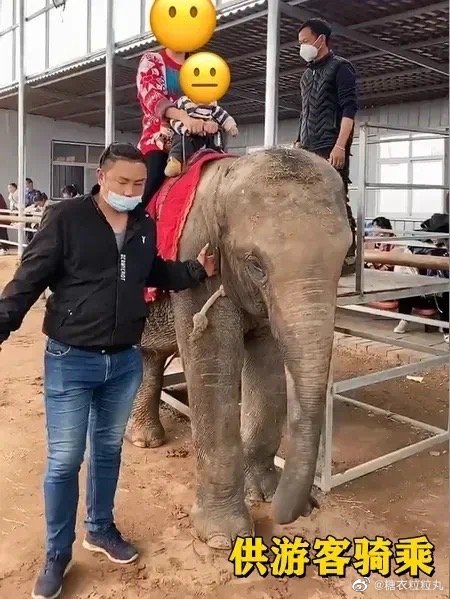

Posts about Molly being abused started to gain more online attention in the summer of 2021, and photos showing the stark difference between Molly at the age of one and at the age of five years old circulated online.
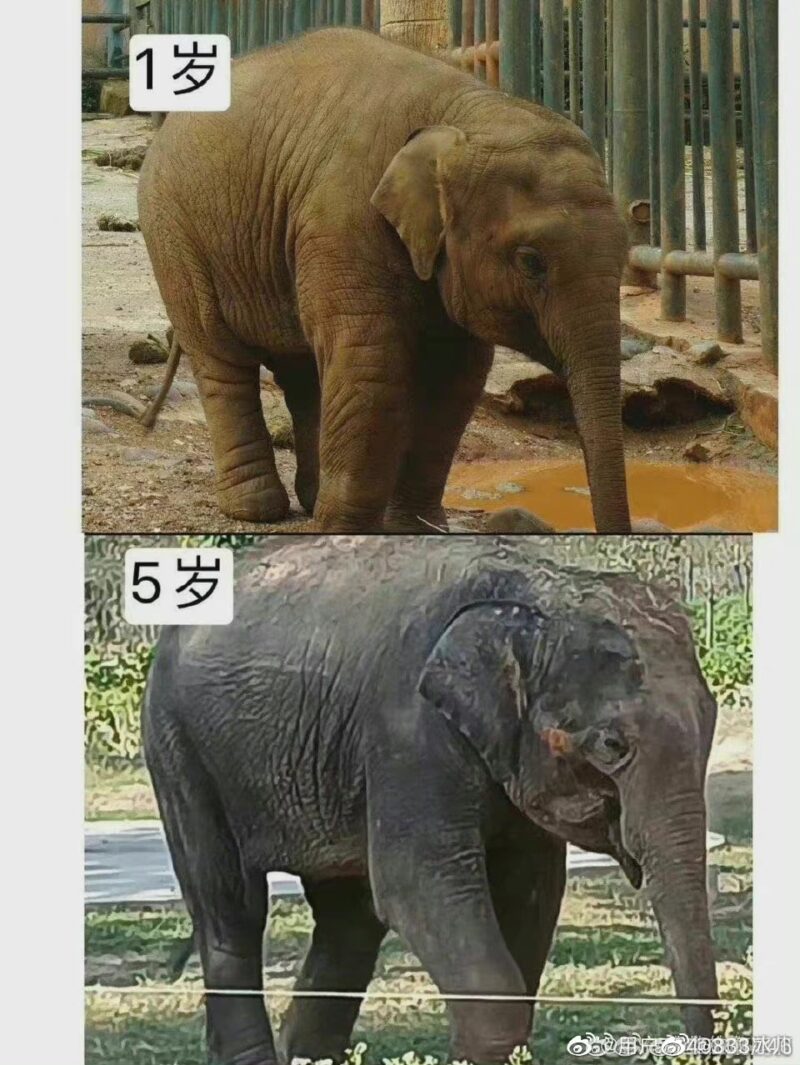
After so many netizens expressed concerns about the elephant’s mistreatment, the local zoo and authorities issued a statement in September of 2021 saying Molly was not being maltreated. But because no further clarification was given, netizens kept pushing for the elephant to be rescued and reunited with its mother in Kunming.
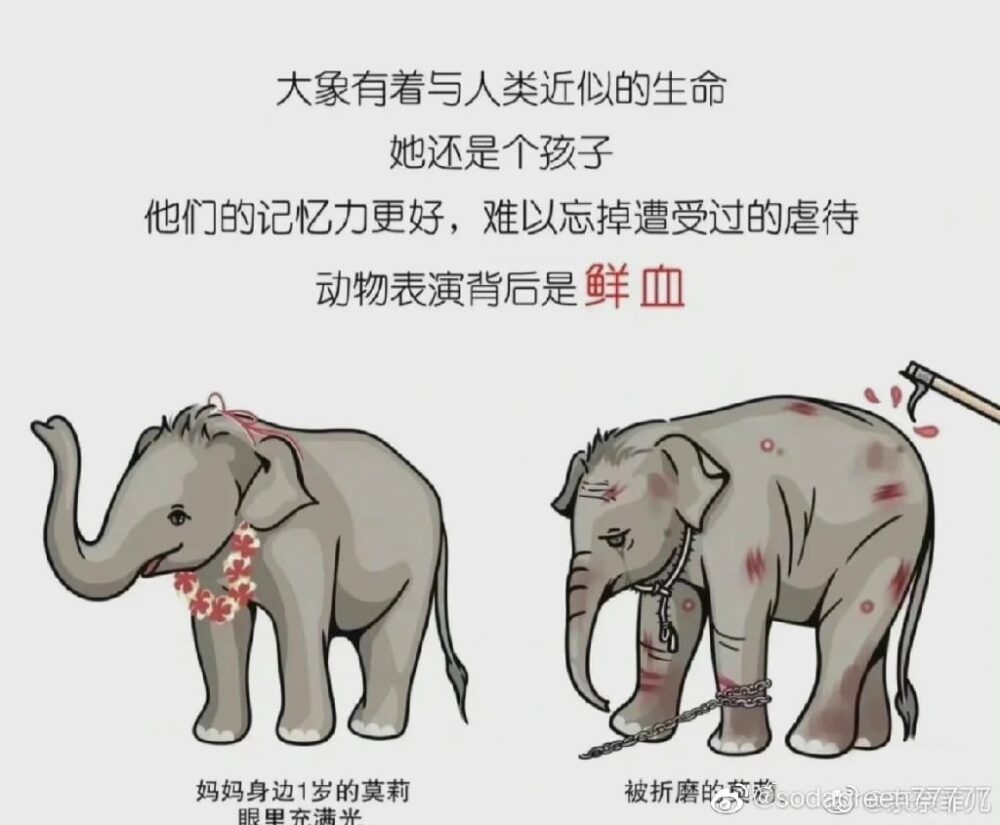
One of the reasons why Molly became a big topic on social media again this week is because her case was pushed forward on the social media platform Xiaohongshu, after which it also gained renewed attention on Weibo due to various big accounts posting about ‘Save Molly’ and calling for an elephant performance ban in China.
One of these influentiual people expressing concerns over the elephant is Taiwanese actress Chen Qiao’en (陈乔恩), who posted about Molly on Weibo on April 24, using the #SaveMollytheElephant hashtag:
“It’s heartbreaking to see Molly covered in wounds. She shouldn’t be treated like this. Please reject animal performances, please don’t abuse animals, please save Molly the elephant.”
Chen’s post received over 90,000 likes and a lot of attention, leading to more netizens voicing their concerns about the elephant and joining online groups about Molly’s case.
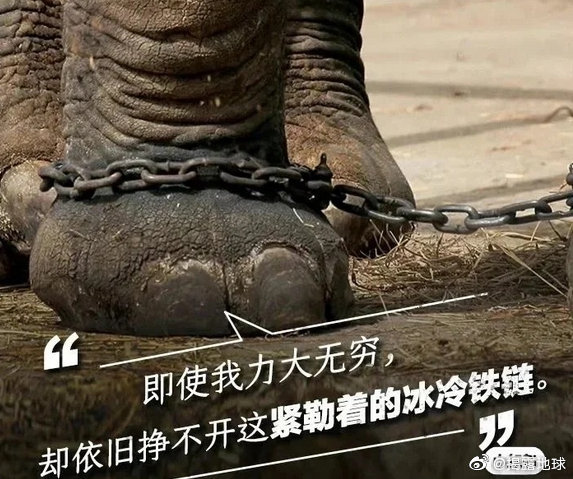
As voices speaking up for Molly grew louder, some of the groups and hashtags related to the ‘Save Molly’ movement were taken offline by Weibo censors.
“There are many ‘Molly’s’ in this world, the more you try to silence us, the louder we will get,” one Weibo commenter wrote.
A Maze of Conflicting Regulations
Beyond Molly’s situation, there is a somewhat confusing web of laws, regulations, and standards about wildlife protection and animal performances in China.
China’s Wildlife Protection Law (WPL), the national legislation for animal protection, was enacted in 1989. Throughout the decades, the law was widely criticized for not doing enough to actually protect animals and promoting the use of wildlife for human benefit. Although the law was revised in 2015, it still facilitated the commercial use of wildlife and there is no anti-cruelty legislation that might penalize cruelty to animals in zoos, wildlife parks, or other venues where wild animals are kept in captivity (Li 2021, p. 227).
When it comes to China’s zoos and safari parks, there are two regulatory bodies that play an important role: China’s Ministry of Housing and Urban-Rural Development (住房城乡建设部, MHURD), and the Chinese State Forestry and Grassland Administration (国家林业和草原局, SFGA).
The Ministry of Housing and Urban-Rural Development (MHURD) is the relevant organ overseeing Chinese zoos, which are usually owned and managed by municipal or regional governments. The MHURD also hosts the Chinese Association of Zoological Gardens (中国动物园协会, CAZG), which is an organization that most of China’s larger zoos are members of.
China’s Ministry of Housing and Urban-Rural Development banned animal performances in China over a decade ago in 2011, although the rule excluded performances at aquariums and did not specify penalties (China Daily 2012). In 2013, the MHURD also issued the “National Zoo Development Outline” (“全国动物园发展纲要“) which strictly prohibited all animal performances in zoos.
Nevertheless, many zoos and wildlife parks have still continued shows featuring cycling bears, jumping tigers, and dancing elephants since then – and not necessarily illegally.
One of the reasons why there are conflicting regulatory regimes is because “zoos” and “wild animal parks” fall under different jurisdictions in China.
The MHURD 2011 administrative national ban on animal performance was unable to stop animal performances at China’s privately-owned wild animal parks, safari parks, or circuses, since they are administered by the Chinese State Forestry and Grassland Administration (SFGA), which also regulates the holding of all exotic species, including those in city zoos. The SFGA, however, does not consider the welfare of these animals its responsibility (see Arcus Foundation 2021, p. 99; Li 2021, p. 227).
City zoos can theoretically still subcontract animal performances to private companies within special areas of the zoo as long as their contract was signed before 2011, and can also still sell or trade animals with these parks. Dozens of zoos with performance programs have therefore continued animal performances, sometimes also in violation of policies in place (Arcus Foundation 2021, p. 99; Li 2021, p. 19).
In line with the WPL, the SFGA is able to provide permits that allow animal parks to hold animal “exhibition and performances.” The Qinyang Swan Lake Ecological Garden, where Molly is, also has a permit to “showcase wildlife” (展演野生动物), basically giving them a green light to put on performances.
Beyond Molly
On April 27, the Kunming Zoo responded to the online storm over Molly, claiming that the elephant is in good condition and that the zoo in question has since long stopped animal performances.
Chinese media outlet Phoenix News also published an article about Molly on April 30, aimed to uncover the truth about the conditions in which Molly is currently being kept at the Qinyang Hesheng Forest Zoo.
The report concluded that Molly was kept in good living conditions, and that the elephants at the park were not participating in any (circus) performances. The person in charge of the Qinyang Hesheng Forest Zoo, Shi Baodong (史保东) reportedly claims the park has stopped all animal performance activities as of April 2019, with Shi denying all claims of animal abuse taking place.
Staff members also said that some of the footage and images circulating online in relation to the Molly incident are not of Molly at all, instead showing elephant training in Thailand, India and other countries.
But many Chinese netizens believe the zoo is not speaking the truth, since social media users said they still saw Molly performing and carrying zoo visitors on her back in 2021. Even if Molly is not performing at this moment, many still think that media reports and statements cover up the truth of how the elephant is really doing.
For others, the ‘Save Molly’ hashtag is not just about Molly anymore, as the elephant has come to represent hundreds of other elephants who are living in captivity in China and are forced to perform. They hope the government can prohibit elephant performances entirely and introduce better laws and regulations to prohibit animal performances and mistreatment.
“One person doesn’t have a lot of power, but as a group we have more power,” the description for one Molly supertopic on Weibo says (小吉象莫莉).
Underneath one of the Weibo threads about Molly’s current situation, a top commenter replies: “This is not just about Molly anymore, we want to protect all of the ‘Molly’s’ out there.”
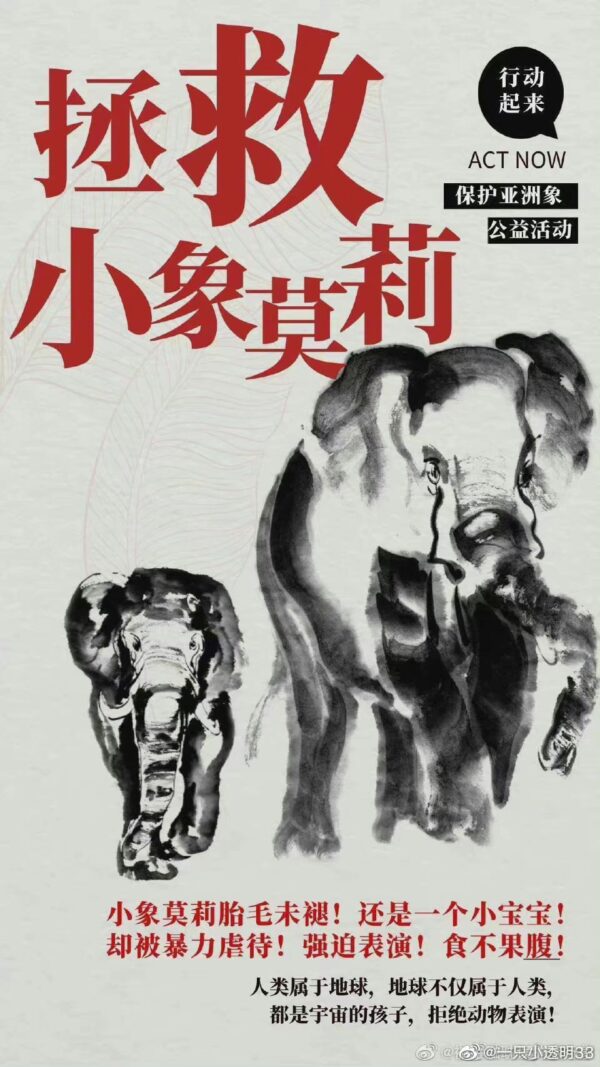
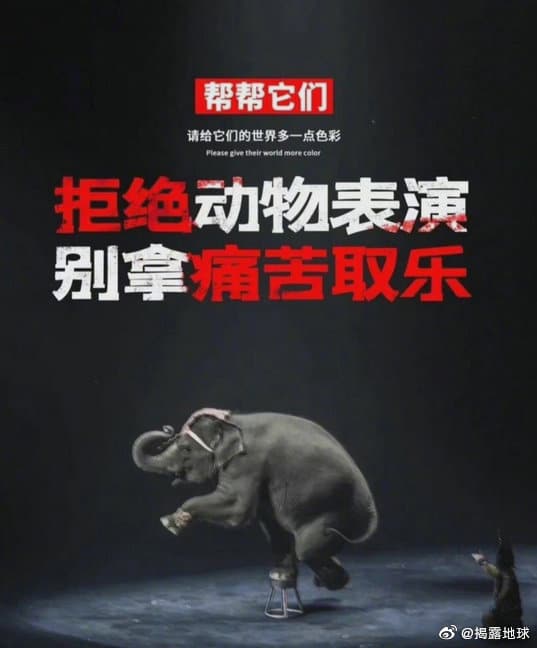
“Reject animal performances, don’t turn suffering into entertainment.”
This is not the first time netizens come into action to get justice for zoo animals that are suffering. In 2017, visitor photos of a mouth-foaming, lethargic-looking panda at Lanzhou Zoo also caused outrage on Weibo. In 2016, netizens also jumped to the aid of a polar bear by the name of Pizza after he was found living in deplorable conditions at an aquarium in the Grandview Mall in Guangzhou. He was later removed from the mall.
To follow more updates regarding Molly, check out Twitter user ‘Diving Paddler’ here. We thank them for their contributions to this article.
To read more about zoos and wildlife parks causing online commotion in China, check our articles here.
By Manya Koetse
References (other sources linked to within text)
Arcus Foundation (Ed.). 2021. State of the Apes: Killing, Capture, Trade and Ape Conservation. Cambridge: Cambridge University Press.
China Daily. 2012. “Animal Rights Groups Seek Performance Ban.” China Daily, April 16 http://www.china.org.cn/environment/2012-04/16/content_25152066.htm [Accessed May 1 2022].
Li, Peter J. 2021. Animal Welfare in China: Culture, Politics and Crisis. Sydney: Sydney University Press.
Get the story behind the hashtag. Subscribe to What’s on Weibo here to receive our weekly newsletter and get access to our latest articles:
Spotted a mistake or want to add something? Please let us know in comments below or email us. First-time commenters, please be patient – we will have to manually approve your comment before it appears.
©2022 Whatsonweibo. All rights reserved. Do not reproduce our content without permission – you can contact us at info@whatsonweibo.com.
The post Chinese Netizens Voice Concerns over Molly the Elephant, Call for Animal Performance Boycott appeared first on What's on Weibo.